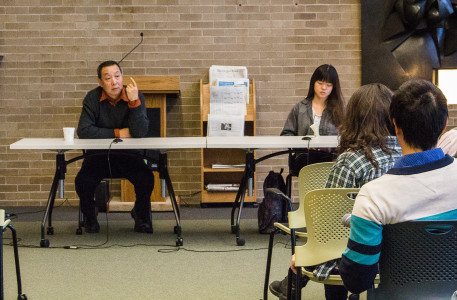Emma Friedlander
friedlan@grinnell.edu
Xu Xing, an acclaimed writer and filmmaker from Beijing, visited campus this week to share his documentary, “A Chronicle of my Cultural Revolution.” Xing’s short stories and documentaries explore themes of loneliness and self in recent Chinese history.
“A Chronicle of my Cultural Revolution” depicts China’s Cultural Revolution of 1966-1976 from a human perspective, informed by Xu’s personal experiences during this traumatic upheaval and those of the people he interviewed. The entire film is framed around the story of a love letter Xu wrote for a classmate, Ying Tao, when they were in school. The letter was largely political, criticizing the Cultural Revolution. When Xu was found out, he was ostracized to the countryside, where he wandered for years.

Ying is one of the primary people Xu interviewed for the documentary, along with a man who gave him shelter during his period of exile, two brothers who witnessed firsthand the murder of their mother by agents of the state and a poet who barely escaped execution after writing a controversial song at the age of 17. Xu expressed that he felt this latter incident especially portrays the randomness and corruption of innocence of the Cultural Revolution.
“[I feel] that this song didn’t originally have any political protest or political criticisms in it,” Xu said during the question and answer session following the screening. “It was a poem written by a child longing for his mother, longing for his home, longing for his lost youth … It’s a clash between two ideologies: China and perhaps the United States used the song to play up protests that weren’t its original intentions. It feels like he didn’t really have the consciousness to write a protest song. … It was just random. He was the sacrificial lamb, so to speak, of these two powers that were in conflict.”
Xu’s emphasis of human stories in the Cultural Revolution goes against the Chinese government’s practice of censorship of this history and brings to light episodes that would otherwise be forgotten.
“These works of arts will cause us to reflect on things,” Xu said. “[I hope] you will look at history, take in history, especially recent history. This is the only way that the future can be made better. When in the process of making the movie, I looked at a middle school/high school textbook. The entire passage about this period is about half a page long. The half page is a reflection of the government’s attitude towards [the Cultural Revolution.]”
During the question and answer session, many audience members expressed their gratitude and respect for Xu’s film as an accurate representation of the Cultural Revolution, which is hard to come by in China due to censorship.
“I’m a Chinese major and took a gap year in China and know more about Chinese history than the average person,” said Stewart Bass, ’18. “[The Cultural Revolution] isn’t taboo, but it’s the closest way you could describe it … The most striking part of this movie is when they’re out at Mao Zedong’s house and talk to a student about Mao, who says Mao collapsed three mountains: imperialism, feudalism, and capitalism. All of the Chinese international students around me were saying, ‘That’s a textbook answer!’ It really goes to show the indoctrination.”



















































